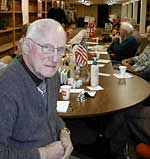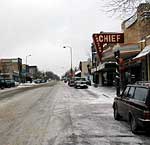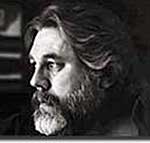Debating the merits of big-box retail
By Tom Robertson
Minnesota Public Radio
December 10, 2001
|
| RealAudio |
The city of Bemidji in northern Minnesota is built on geographic margins - vast prairies to the west, dense forest to the east, and at the center, an unassuming Mississippi River flowing into Lake Bemidji. For years the town's quiet character was based on logging, farming and a stable downtown economy. But a rapid spurt of growth has transformed Bemidji into an economic hub, home to big box retailers and chain restaurants. While many see the arrival of the retail giants as good news, others fear it will dilute its character.
| |
|
|
|
||
Members of the Bemidji Kaffee Klatsch Guys have been meeting every weekday for years. They gather in the basement of a downtown bank. Most are in their 80s. Once, they were the movers and shakers of the community. Now they come together to discuss the news of the day.
These guys remember when all of the shopping in Bemidji was done downtown. Times have changed. The city's retail center began to shift westward in the mid-1970s. The construction of a mall and an assortment of fast food joints transformed a forest into a retail strip that's been growing ever since.
Just within the past few years, the strip has seen the arrival of several big box retailers - Target, Home Depot and, opening this winter, Wal-Mart. Most of the Kaffee Klatsch Guys worry about what it's doing to an already weakened downtown.
"There's going to be some small businesses that will be going out. There's no doubt in my mind about that....The amount of businesses that are coming in, I don't think this community is big enough to support these huge boxes. Something's got to give," they say.
Some of the morning coffee crew say it's the price of progress. Charlie Naylor, 87, says the little guys may have to find a new niche.
"You've got to fight your own battle in this world," says Naylor. "Change is inevitable, and you've got to roll along with the deal. You can't change it."
| |
|
|
|
||
The growth of the city's west end retail strip was no accident. Much of it happened under the watch of former Mayor Doug Peterson, who served for more than 25 years. Peterson says when he first took office, the town was stagnant.
"My father told me when I was first elected mayor, 'You can lead this community to either grow or die. And there's no in-between,'" says Peterson. "You don't stand still forever...and I chose to try to make it grow."
There are some, like local author Kent Nerburn, who say Bemidji's growth is out of control. Nerburn says civic leaders made poor choices and bowed to the wishes of the big box retailers. He says the city could have just said "no." Nerburn calls it the "St. Cloudification" of Bemidji - the fast growth of retail chains sprawling in every direction.
"Those of us who have lived somewhere else - and thus lack that supposed moral authority that comes with being a longtime resident - say, 'No, St. Cloud is the civic anti-Christ, it's what we don't want to be,'" says Nerburn. "It's a visual garbage dump. And now we're making a headlong run into becoming a visual garbage dump."
Former Mayor Peterson says before the retail boom began, Bemidji residents saw themselves as small town citizens. They didn't need much to get by, and were happy with their provincial lifestyle. Peterson says there are still people who are nostalgic about the old days.
"You still have that same group of people that would still like to identify with Smalltown, USA, that are opposed to the type of growth that we've seen in the last 10 years, and are worried and concerned that we're going too fast - that all of the sudden they're going to lose that identity," says Peterson.
|
"My father told me when I was first elected mayor, 'you can lead this community to either grow or die. And there's no in-between.' You don't stand still forever...and I chose to try to make it grow."
- Former Bemidji Mayor Doug Peterson |
Nerburn says he understands growth is inevitable. But he says there's been no civic responsibility for aesthetics. Without that, he says, the character of the town is lost.
"I see us damaging the entire spirit of place that is unique to us," Nerburn says. "It's a very odd phenomenon to know that you can go anywhere in the country and through a drive-through, and be handed a bag of something, and know that it's going to be the same as anywhere else. For some people this is comforting. But I find it spiritually enervating. I find it destructive of the heartbeat of a community. And I see us embracing it wholesale."
"I think the coming of Wal-Mart might have been a real bonk on the head for us," says Louise Mengelkoch, a mass communications professor at Bemidji State University. She says the arrival of the big boxes betrays the very thing that makes Bemidji unique.
"It's such a devil's bargain. Because part of the reason a lot of us live here is because we don't want to live in a place like the Twin Cities or St. Cloud. But as we live here we start thinking, 'We really need a few of these things.' And the minute you start to get more of these things, you start becoming like the place that you didn't want to be," says Mengelkoch. "And where do you draw the line? That's what we haven't figured out."
The character or essence of a community is a hard thing to put your finger on. But Peterson says what makes a town unique is the people. He graduated from high school in 1957. Most of his class moved away because there were few jobs at home. Peterson says now many young people are staying.
"We've got a whole new generation of people here. People who spent a lot of time and money to travel to Grand Forks and Minneapolis and Duluth and these different areas - to get the type of shopping and dining and entertainment that they feel they want and need. And they want it for their hometown now," he says.
Peterson once championed growth. He's proud of it. But he now realizes it can snowball.
| |
|
|
|
||
"You work and work for 10 years to get this growth started, to get something happening. And then it gets to the edge, and then all of the sudden it goes over the edge and once it gets beyond that point, you kind of lose control," says Peterson.
A downtown plays an essential role in the character of any community. In Bemidji's downtown, there are some empty storefronts. There are more second-hand stores and pawn shops than there used to be. But there's also live theater, several museums and, just a block away, scenic lakeshore. Author Kent Nerburn says there's just enough downtown left to save.
"We have the raw material, we've got the physical space and we have an area with character. We've got it adjacent to the lakeshore. The challenge of the next 50 years is to not lose that - to not let it be bulldozed, to not let the lack of parking kill that area, to not let landlord greed kill that area," says Nerburn.
Some of the Kaffee Klatsch Guys say small town life in some ways was better. But they wouldn't want to turn back the clock. Hap Johnson says he may not know everyone on the street like he used to. But he says a progressive community is better than one standing still. Johnson says people are well aware of what the big box retailers are doing to the little guys.
"I think it's crossed everyone's mind. We've thought of it. But I don't think we're going to ignore Wal-Mart. They'll get some of my business," Johnson says.
The west end of Bemidji is probably destined to remain a commercial strip. But developers are drooling over what is about to happen on the south end of town. Georgia-Pacific is selling off a huge chunk of lakeshore property. There's talk of hotels, retail shops, new homes, and a public beach. The prospective owner has hired former Bemidji Mayor Doug Peterson to help with the development. What happens on that property will change the face of the city.



